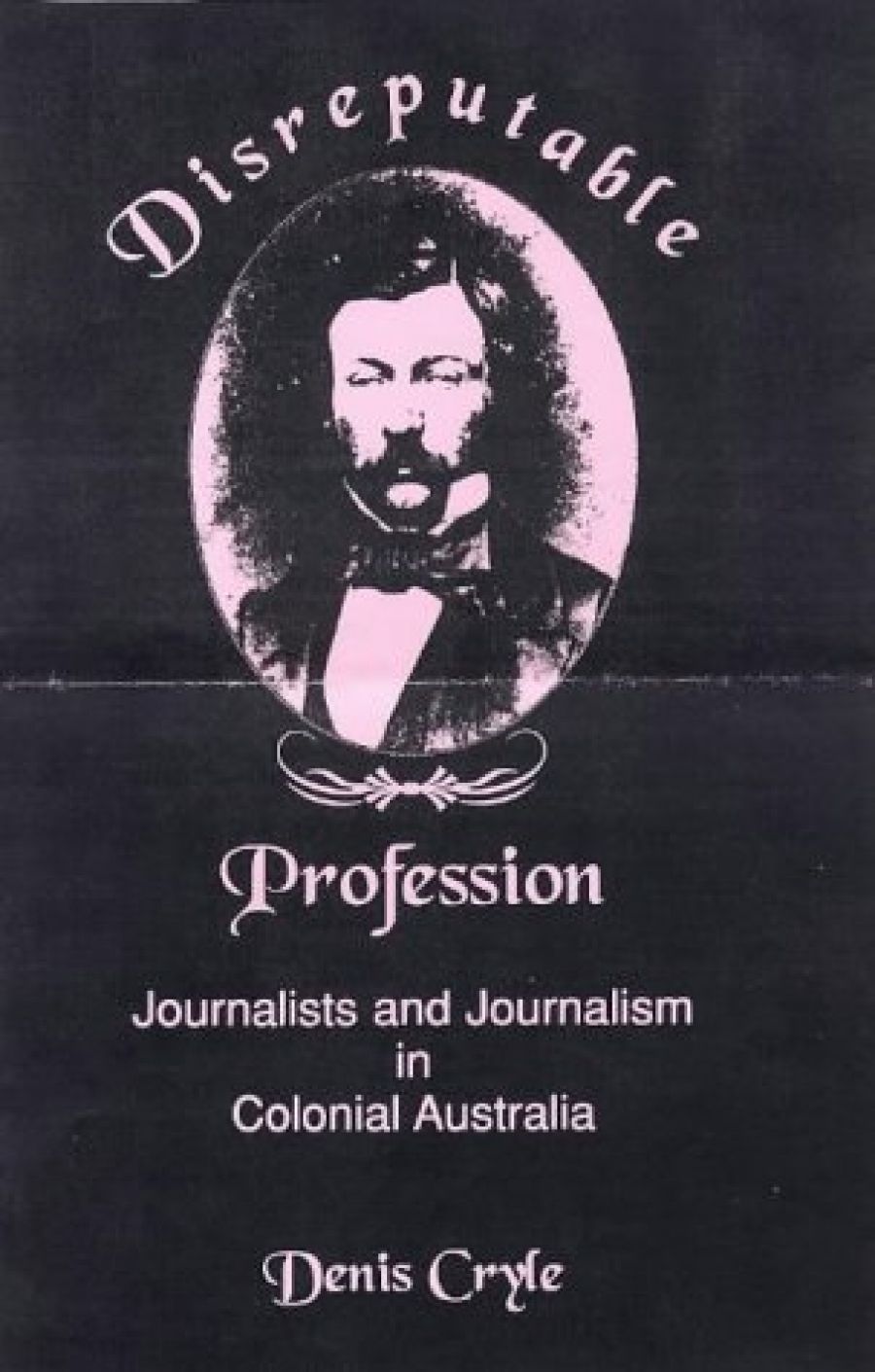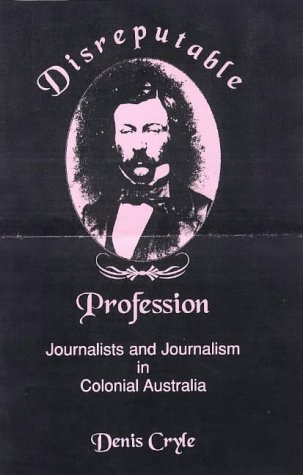
- Free Article: No
- Contents Category: Journalism
- Review Article: Yes
- Online Only: No
- Custom Highlight Text:
In his introduction, Queensland academic Denis Cryle writes, ‘Journalism history is bound up, not only with literary history in its contemporary sense, but with cultural history’. So true, yet so little appreciated or acknowledged in this country until very recently; unlike , say, the United States where the interplay of journalism and literature is basic to an understanding of writers ranging from Walt Whitman and Mark Twain last century to Hemingway and John Dos Passos in our own . As it was, it seems to have taken the very different works of the two Helens, Garner and Demidenko/Darville, to bring such issues into public consideration in this country.
- Book 1 Title: Disreputable Profession
- Book 1 Subtitle: Journalists and journalism in Colonial Australia
- Book 1 Biblio: Central Queensland UP, $19.95pb, 178pp
- Book 1 Cover Small (400 x 600):

This collection of essays by five academics turns back the clock, quite appropriately, to give us an insight into the earliest manifestations of the press in this country – from the gutsy, belligerent ‘convict’ press to what H.M. Green described as the ‘quieter, more dignified’ journalism of the second half of the nineteenth century. It achieves this by pursuing the careers of seven colonial journalists. At time s, it seems the essayists are unaware of the richness of the material they are handling – for example, a character like George Dunmore Lang who may have believed every high-minded word he wrote or equally may have believed very little at all; or George Loyau, the ‘literary’ journalist who composed sentimental poems and fictions for the Queensland regional press, taking as one of his themes the cruelty inflicted on the pioneers and their womenfolk by ‘black savages’ at a time when Aboriginal communities in that colony were being systematically slaughtered and split asunder by the Native Police; or, again, the strange progression of a genuinely intellectual journalist like William Coote, which saw him begin his career editing a ‘Journal of Science, Literature and Art’ in Hobart and end it arguing the brief of the North Queensland secessionist movement.
Little of interest has been written about journalism in Australia, but a single line of Tim Winton’s, in his novel, Shallows, went a considerable way towards redressing that. Winton said journalists are people for whom other people’s experiences are more real than their own. A variation on Winton’s observation can be applied to Thadeus O’Kane ,firebrand editor of the Northern Miner, in Charters Towers, from 1873–89. Before migrating to Australia, O’Kane, an Irishman and former candidate for Holy Orders, had named the former English Prime Minister, Lord Palmerston, as co-respondent in his divorce case and then lost the suit when he was unable to prove that he and his wife had ever been formally wed.
In his chosen profession, O’Kane stands in stark contrast to those of his colleagues in this collection who exhibit the journalistic tendency to bend with the prevailing wind. He spewed defiance, won and lost innumerable court cases, was simultaneously reviled and lionised. Unfortunately, in respect of the local Chinese community, he was virulently racist, because he otherwise stands as a model of journalistic vision with a genuine commitment to his readers. ‘What is to prevent a daily newspaper from being made the greatest organ of social life?’ he wrote. ‘Books have had their day – the theatres have had their day – the temple of religion has had its day. A newspaper can be made to take the lead of all these ‘. And again: ‘The Press is the great Lay Pulpit of the present – it addresses a universe, and speaks the language of universal Humanity, Brotherhood and Freedom’. However, as contemporaries observed, O’Kane presented a paradox.
From those uncompromising sledge-hammer articles one would picture a huge, powerful blackthoray son of the sod with a voice like the roar of the Atlantic on the rocks of Donegal, whereas you were presented to a gentle little fellow with a gentle, winning manner. All there was of him, though, was game and genuine.
Similarly, the man who could make the word simmer when printed on page was a conspicuous failure as an orator when he ran for parliament. ‘His speeches were too carefully prepared, too loaded with facts and figures’. For such a person, the printed page can become a sort of mask.
It is tempting to criticise this book, given its sweeping sub-title, for what it is not. In 1976, for example, Michael Wilding edited a collection of the writings of Marcus Clarke which included both his novel, For the Term of His Natural Life, and the series of newspaper articles on Port Arthur, written for the Melbourne Argus in 1873, which alerted him to the subject. Which form of writing gives the clearer, more forceful picture of the Tasmanian convict system? In my view, the journalism. The novel is a gothic melodrama. Similarly, in seeking to understand the character of my home state in its formative years, I have found no better guide than ‘The History of Van Diemen’s Land from the year 1824-35 inclusive’, written from prison by Henry Melville, the editor of the Colonial Times. Melville had been jailed by Governor Arthur, and, to quote Robert Hughes, Tasmania under George Arthur was the closest thing to a totalitarian state that ever existed in the British Empire.
As it is, this book is a narrow slice of the subject it purports to cover, but it is a start. The writing is scholarly and earnest and the reader has to be prepared to work, but for anyone wishing to explore the subject of journalism this collection represents an invaluable resource.


Comments powered by CComment